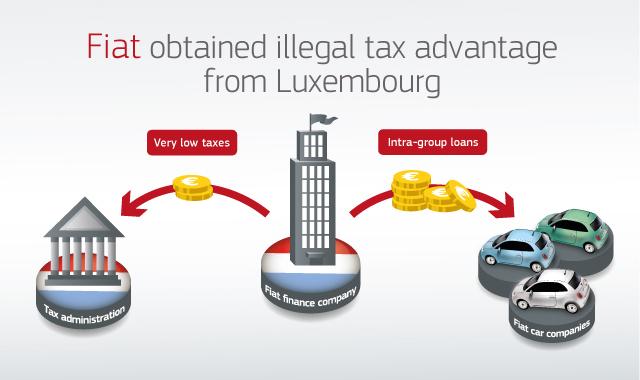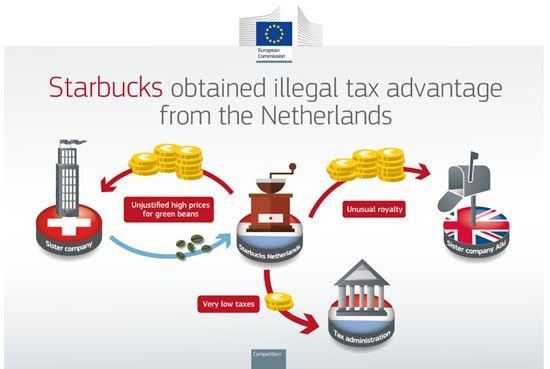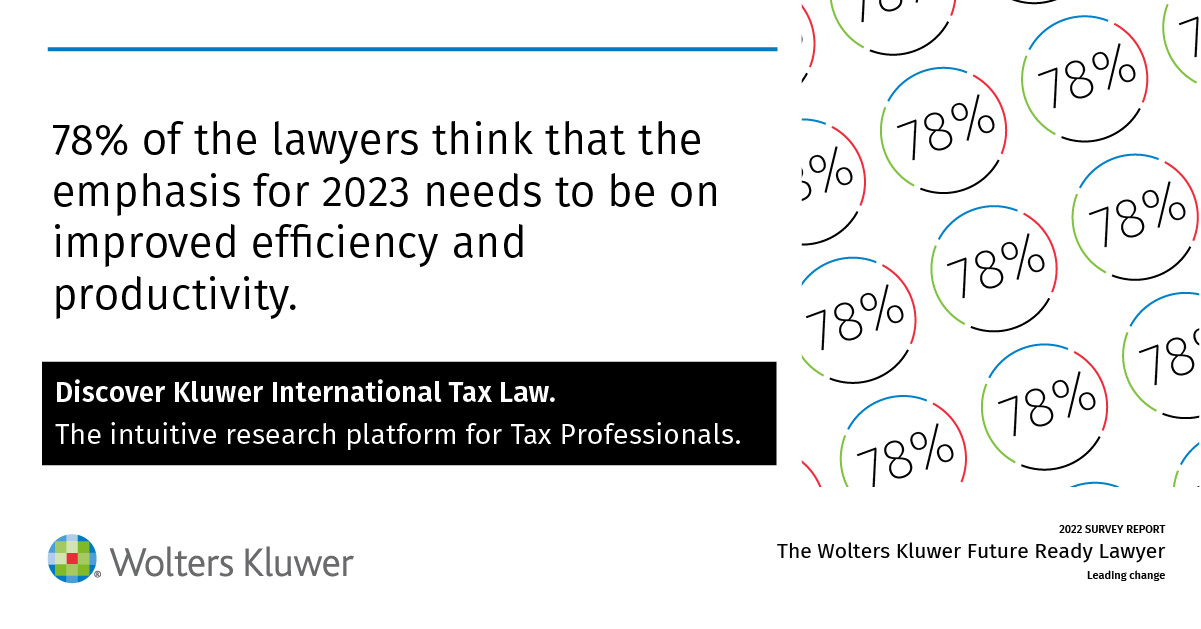Both Starbucks and Fiat represent, if one listened closely to the live press release broadcast, an first salvo by the EU Commission to establish that it has the authority, under a State Aid premise, to step into the shoes of the national revenue authority and re-allocate profits of an enterprise according to the EU Commission’s interpretation and analysis of the arm’s length concept.
But importantly, these two cases also, I think, exhibit the trepidation of the EU Commission to venture into the area of interposing its own judgement call (i.e. second guessing) national revenue authorities arm’s length determination memorialized in advance pricing agreements (APAs). The trepidation results from several causes, including weaknesses in the EU Commission’s arm’s length determinations and justifications thereof, and even more so, from the geopolitical ramifications.
The trepidation is exemplified by the very low adjustments the EU Commission found, after its nearly year of investigation. The adjustments are enough to be noticed by the EU state authorities and the companies, but de minimis in the context of corporate annual profits, corporate profit accumulation over time (e.g. perpetual deferral), corporate tax reserves, and de minimis in the context of revenue collection for either The Netherlands or Luxembourg.
Starbucks’ potential 30 million Euro re-capture tax bill by The Netherlands (EU Commission required), dating back to accumulation from 2008, will, assuming the tax bill stands after Starbucks’ appeal and after Starbucks’ challenge the decision up through the EU Court Of Justice, be offset by a US tax credit of like amount. Consequently, the low adjustment is a wash out, albeit could require a cash flow payment in the nearer future than the perpetual one under US tax deferral accounting. 30 million Euro is too small to be noticeable to Starbucks shareholders or to the US Treasury, especially when the tax credits are applied.
Had the EU Commission found, as it alluded that it is able to, that the State Aid amounted to the hundreds of millions or even billions of Euro, the intensity of the EU Commission-National government conflict would have changed, and the EU Commission would have lost that battle with the stakes so high. Fiat would have drawn Italy into the fray, to align with Netherlands, Ireland and Luxembourg. As more advance pricing agreements are challenged, more national government would align against the EU Commission. At some tipping point, the EU Commission would have to withdraw from the fight or face a bloodied nose.
Yet, more so a danger for the EU Commission, had the EU Commission’s decision been an exaggerated amount, then the US Treasury would have been forced to act as if a trade war had broken out. Treasury beating up on Starbucks for transfer pricing out of the US tax base is OK because Starbucks in a US company, as far as the US Treasury is concerned. Starbucks represents potential US deficit reduction tax dollars.
Had the EU Commission decided for a large amount well beyond any tax credit relief, thus which would have represented a significant subsidy from the US to EU national budgets and/or a significant subsidy from US retirement system shareholders to EU budgets, one might imagine the joint-Republican Democratic Senate hearing called by Washington state’s two Democratic senators Patty Murray and Maria Cantwell. That hearing would conclude a joint statement to Treasury demanding it report back how it intends to implement a tit-for-tat strategy against EU companies to extract an equal amount to that the EU Commission pulled from the bowels of Starbucks reserves.
Throw in enough US multinationals with HQs in the various states such as New York, Illinois, California and Texas, Congress may actually in rare bipartisan stature pass tit-for-tat legislation by year end requiring Treasury to act. Perhaps a $5 billion Section 482 adjustment against each of the top 50 European companies measured by revenues. The EU would respond, and the US retort, to and fro, until the weight of taxation slowed cross border investment to a trickle.
But the EU Commission instead chose to bark very loudly and withhold its bite. Probably it has avoided the worst case scenarios of political warfare presented above.
With such a small award, the various stakeholders will let the appeals and ECJ process run its course before acting. Or just maybe, the US Congress and US Treasury will understand that true ramifications of yesterday’s EU Commission decisions, and even for one US dollar at stake, will go to the mat on behalf of Starbucks, Apple, Microsoft, Google, Amazon etc.
___________
Excerpt from the EU Commission Release:
Following in-depth investigations, which were launched in June 2014, the Commission has concluded that Luxembourg has granted selective tax advantages to Fiat’s financing company and the Netherlands to Starbucks’ coffee roasting company. In each case, a tax ruling issued by the respective national tax authority artificially lowered the tax paid by the company.
Tax rulings as such are perfectly legal. They are comfort letters issued by tax authorities to give a company clarity on how its corporate tax will be calculated or on the use of special tax provisions. However, the two tax rulings under investigation endorsed artificial and complex methods to establish taxable profits for the companies. They do not reflect economic reality. This is done, in particular, by setting prices for goods and services sold between companies of the Fiat and Starbucks groups (so-called “transfer prices”) that do not correspond to market conditions. As a result, most of the profits of Starbucks’ coffee roasting company are shifted abroad, where they are also not taxed, and Fiat’s financing company only paid taxes on underestimated profits.
This is illegal under EU state aid rules: Tax rulings cannot use methodologies, no matter how complex, to establish transfer prices with no economic justification and which unduly shift profits to reduce the taxes paid by the company. It would give that company an unfair competitive advantage over other companies (typically SMEs) that are taxed on their actual profits because they pay market prices for the goods and services they use.
Therefore, the Commission has ordered Luxembourg and the Netherlands to recover the unpaid tax from Fiat and Starbucks, respectively, in order to remove the unfair competitive advantage they have enjoyed and to restore equal treatment with other companies in similar situations. The amounts to recover are €20 – €30 million for each company. It also means that the companies can no longer continue to benefit from the advantageous tax treatment granted by these tax rulings. …
Fiat
Fiat Finance and Trade, based in Luxembourg, provides financial services, such as intra-group loans, to other Fiat group car companies. It engages in many different transactions with Fiat group companies in Europe.
The Commission’s investigation showed that a tax ruling issued by the Luxembourg authorities in 2012 gave a selective advantage to Fiat Finance and Trade, which has unduly reduced its tax burden since 2012 by €20 – €30 million.
Given that Fiat Finance and Trade’s activities are comparable to those of a bank, the taxable profits for Fiat Finance and Trade can be determined in a similar way as for a bank, as a calculation of return on capital deployed by the company for its financing activities. However, the tax ruling endorses an artificial and extremely complex methodology that is not appropriate for the calculation of taxable profits reflecting market conditions. In particular, it artificially lowers taxes paid by Fiat Finance and Trade in two ways:
- Due to a number of economically unjustifiable assumptions and down-ward adjustments, the capital base approximated by the tax ruling is much lower thanthe company’s actual capital.
- The estimated remuneration applied to this already much lower capital for tax purposes is also much lower compared to market rates.
As a result, Fiat Finance and Trade has only paid taxes on a small portion of its actual accounting capital at a very low remuneration. As a matter of principle, if the taxable profits are calculated based on capital, the level of capitalisation in the company has to be adequate compared to financial industry standards. Additionally, the remuneration applied has to correspond to market conditions. The Commission’s assessment showed that in the case of Fiat Finance and Trade, if the estimations of capital and remuneration applied had corresponded to market conditions, the taxable profits declared in Luxembourg would have been 20 times higher.

Starbucks
Starbucks Manufacturing EMEA BV (“Starbucks Manufacturing”), based in the Netherlands, is the only coffee roasting company in the Starbucks group in Europe. It sells and distributes roasted coffee and coffee-related products (e.g. cups, packaged food, pastries) to Starbucks outlets in Europe, the Middle East and Africa.
The Commission’s investigation showed that a tax ruling issued by the Dutch authorities in 2008 gave a selective advantage to Starbucks Manufacturing, which has unduly reduced Starbucks Manufacturing’s tax burden since 2008 by €20 – €30 million. In particular, the ruling artificially lowered taxes paid by Starbucks Manufacturing in two ways:
- Starbucks Manufacturing pays a very substantial royalty to Alki (a UK-based company in the Starbucks group) for coffee-roasting know-how.
- It also pays an inflated price for green coffee beans to Switzerland-based Starbucks Coffee Trading SARL.
The Commission’s investigation established that the royalty paid by Starbucks Manufacturing to Alki cannot be justified as it does not adequately reflect market value. In fact, only Starbucks Manufacturing is required to pay for using this know-how – no other Starbucks group company nor independent roasters to which roasting is outsourced are required to pay a royalty for using the same know-how in essentially the same situation. In the case of Starbucks Manufacturing, however, the existence and level of the royalty means that a large part of its taxable profits are unduly shifted to Alki, which is neither liable to pay corporate tax in the UK, nor in the Netherlands.
Furthermore, the investigation revealed that Starbucks Manufacturing’s tax base is also unduly reduced by the highly inflated price it pays for green coffee beans to a Swiss company, Starbucks Coffee Trading SARL. In fact, the margin on the beans has more than tripled since 2011. Due to this high key cost factor in coffee roasting, Starbucks Manufacturing’s coffee roasting activities alone would not actually generate sufficient profits to pay the royalty for coffee-roasting know-how to Alki. The royalty therefore mainly shifts to Alki profits generated from sales of other products sold to the Starbucks outlets, such as tea, pastries and cups, which represent most of the turnover of Starbucks Manufacturing.

Recovery
As a matter of principle, EU state aid rules require that incompatible state aid is recovered in order to reduce the distortion of competition created by the aid. In its two decisions the Commission has set out the methodology to calculate the value of the undue competitive advantage enjoyed by Fiat and Starbucks, i.e. the difference between what the company paid and what it would have paid without the tax ruling. This amount is €20 – €30 million for each of Fiat and Starbucks but the precise amounts of tax to be recovered must now be determined by the Luxembourg and Dutch tax authorities on the basis of the methodology established in the Commission decisions.
New investigative tools
In the two investigations the Commission has for the first time used information request tools under a Council decision by Member States of July 2013 (Regulation 734/2013). Using these powers the Commission can, if the information provided by the Member State subject to the state aid investigation is not sufficient, ask that any other Member State as well as companies (including the company benefitting from the aid measure or its competitors) provide directly to the Commission all market information necessary to enable it to complete its state aid assessment. These new tools form part of the State Aid Modernisation initiative launched by the Commission in 2012 to allow it to concentrate its enforcement efforts on aid that is most liable to distort competition.
Further background
Since June 2013, the Commission has been investigating the tax ruling practices of Member States. It extended this information inquiry to all Member States in December 2014. The Commission also has three ongoing in-depth investigations where it raised concerns that tax rulings may give rise to state aid issues, concerning Apple in Ireland, Amazon in Luxembourg, and a Belgian tax scheme.
The fight against tax evasion and tax fraud is one of the top priorities of this Commission. In June 2015, the Commission unveiled a series of initiatives to tackle tax avoidance, secure sustainable tax revenues and strengthen the Single Market for businesses. The proposed measures, part of the Commission’s Action Plan for fair and effective taxation, aim to significantly improve the corporate tax environment in the EU, making it fairer, more efficient and more growth-friendly. Key actions included a framework to ensure effective taxation where profits are generated and a strategy to re-launch the Common Consolidated Corporate Tax Base (CCCTB) for which a fresh proposal is expected in the course of 2016.
The Tax Transparency Package presented by the Commission in March also had its first success in October 2015 when Member States reached a political agreement on an automatic exchange of information on tax rulings following only seven months of negotiations. This legislation will contribute to bringing about a much greater degree of transparency and will act as a deterrent from using tax rulings as an instrument for tax abuse – good news for businesses and for consumers who will continue to benefit from this very useful tax practice but under very strict scrutiny in order to ensure a framework for fair tax competition.
The non-confidential version of the decisions will be made available under the case numbers SA.38375 (Fiat) and SA.38374 (Starbucks) in the State aid register on the DG Competition website once any confidentiality issues have been resolved. The State Aid Weekly e-News lists new publications of State aid decisions on the internet and in the EU Official Journal.
________________________
To make sure you do not miss out on regular updates from the Kluwer International Tax Blog, please subscribe here.
Kluwer International Tax Law
The 2022 Future Ready Lawyer survey showed that 78% of lawyers think that the emphasis for 2023 needs to be on improved efficiency and productivity. Kluwer International Tax Law is an intuitive research platform for Tax Professionals leveraging Wolters Kluwer’s top international content and practical tools to provide answers. You can easily access the tool from every preferred location. Are you, as a Tax professional, ready for the future?
Learn how Kluwer International Tax Law can support you.


